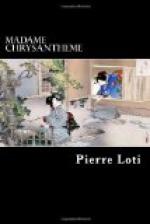Still no letters from Europe, from any one. How things change, become effaced and forgotten. Here I am accommodating myself to this finical Japan and dwindling down to its affected mannerism; I feel that my thoughts run in smaller grooves, my tastes incline to smaller things,—things which suggest nothing greater than a smile. I am becoming used to tiny and ingenious furniture, to doll-like desks, to miniature bowls with which to play at dinner, to the immaculate monotony of the mats, to the finely finished simplicity of the white woodwork. I am even losing my Western prejudices; all my preconceived ideas are this evening evaporating and vanishing; crossing the garden I have courteously saluted M. Sucre, who was watering his dwarf shrubs and his deformed flowers; and Madame Prune appears to me a highly respectable old lady, in whose past there is nothing to criticise.
We shall take no walk to-night; my only wish is to remain stretched out where I am, listening to the music of my mousme’s chamecen.
Till now, I have always used the word guitar, to avoid exotic terms, for the abuse of which I have been so reproached. But neither the word guitar nor mandolin suffices to designate this slender instrument with its long neck, the high notes of which are shriller than the voice of the grasshopper; henceforth, I will write chamecen.
I will also call my mousme Kikou, Kikou-San; this name suits her better than Chrysantheme, which though translating the sense exactly, does not preserve the strange-sounding euphony of the original.
I therefore say to Kikou, my wife:
“Play, play on for me; I shall remain here all the evening and listen to you.”
Astonished to find me in so amiable a mood, she requires pressing a little, and with almost a bitter curve of triumph and disdain about her lips, she seats herself in the attitude of an idol, raises her long, dark-colored sleeves, and begins. The first hesitating notes are murmured faintly and mingle with the music of the insects humming outside, in the quiet air of the warm and golden twilight. First she plays slowly, a confused medley of fragments which she does not seem to remember perfectly, of which one waits for the finish and waits in vain; while the other girls giggle, inattentive, and regretful of their interrupted dance. She herself is absent, sulky, as though she were performing a duty only.
Then by degrees, little by little, it becomes more animated, and the mousmes begin to listen. Now, tremblingly it grows into a feverish rapidity, and her gaze has no longer the vacant stare of a doll. Then the music changes again; in it there is the sighing of the wind, the hideous laughter of ghouls; tears, heartrending plaints, and her dilated pupils seem to be directed inwardly in settled gaze on some indescribable Japanesery within her own soul.




